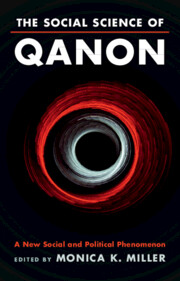Book contents
- The Social Science of QAnon
- The Social Science of QAnon
- Copyright page
- Dedication
- Contents
- Contributors
- Preface
- Part I Introduction to QAnon
- Part II Recruiting and Maintaining Followers
- Chapter 2 Down the Conspiracy Theory Rabbit Hole
- Chapter 3 Psychological Motives of QAnon Followers
- Chapter 4 Cognitive Processes, Biases, and Traits That Fuel QAnon
- Chapter 5 The Role of Moral Cognitions in the Growth of QAnon
- Chapter 6 Emotions and the QAnon Conspiracy Theory
- Chapter 7 Recruitment to QAnon
- Part III QAnon and Society
- Part IV The Role of Communication in Promoting and Limiting QAnon Support
- Part V The Future of QAnon
- Index
- References
Chapter 5 - The Role of Moral Cognitions in the Growth of QAnon
from Part II - Recruiting and Maintaining Followers
Published online by Cambridge University Press: 14 September 2023
- The Social Science of QAnon
- The Social Science of QAnon
- Copyright page
- Dedication
- Contents
- Contributors
- Preface
- Part I Introduction to QAnon
- Part II Recruiting and Maintaining Followers
- Chapter 2 Down the Conspiracy Theory Rabbit Hole
- Chapter 3 Psychological Motives of QAnon Followers
- Chapter 4 Cognitive Processes, Biases, and Traits That Fuel QAnon
- Chapter 5 The Role of Moral Cognitions in the Growth of QAnon
- Chapter 6 Emotions and the QAnon Conspiracy Theory
- Chapter 7 Recruitment to QAnon
- Part III QAnon and Society
- Part IV The Role of Communication in Promoting and Limiting QAnon Support
- Part V The Future of QAnon
- Index
- References
Summary
The COVID-19 pandemic altered people’s lifestyle and caused them to have newfound free time with less ability to socialize. This ample time, and the polarizing influence of Trump’s presidency, likely facilitated the popularization of the conspiracy group QAnon. QAnon’s popularity partly can be attributed to the shift toward Conservative values, explained by Parasite Stress Theory, Moral Foundations Theory, and Terror Management Theory. As QAnon grew in prevalence, which subsequently increased social and aggressive acts from these groups, supporters justified the group’s actions using moral disengagement mechanisms. These acts include physical acts of violence, verbal threats of violence, and the spread of harmful misinformation. The purpose of this chapter is to apply the above-mentioned theories to understand the growth of QAnon, which can be used to garner a broader understanding of the cognitive processes of other conspiracy groups in general.
Keywords
- Type
- Chapter
- Information
- The Social Science of QAnonA New Social and Political Phenomenon, pp. 68 - 86Publisher: Cambridge University PressPrint publication year: 2023



